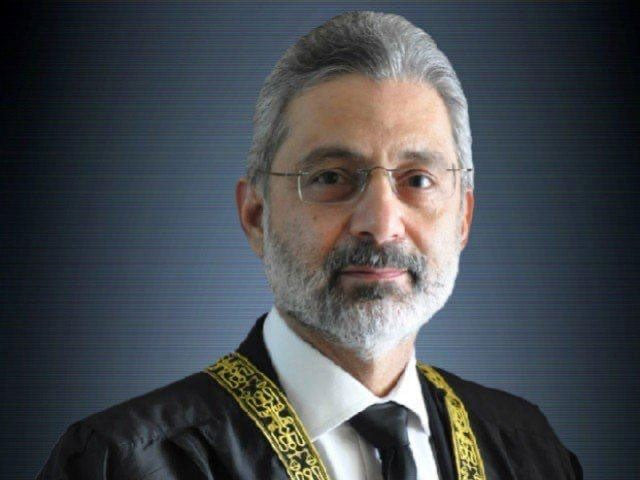Supreme Court adjourns hearing of review petitions in Isa case
Will take up appeal against June 19 order in third week of November

The Supreme Court on Wednesday adjourned the hearing of review petitions filed against the apex court’s June 19 verdict in Justice Qazi Faez Isa case till third week of November.
A seven-judge larger bench, headed by Justice Umar Ata Bandial, took up the review petitions filed by Justice Isa, his wife Sarina Isa and superior bars against the majority judgment endorsed by seven judges of a 10-judge full court.
On June 19, the 10-judge full-court quashed a presidential reference that alleged that Justice Isa had committed misconduct by not disclosing his family member’s foreign properties in his wealth statement. The reference had sought his removal.
In the split order, seven of the judges had, however, referred the case to the Federal Board of Revenue (FBR) and ordered the tax authority to launch an inquiry into foreign assets of Justice Isa’s family.
The short order had asked the FBR chairman to present a report on the basis of the inquiry to the Supreme Judicial Council (SJC), the constitutional forum that can hold a superior judge accountable.
Sarina Isa, Justice Isa and the Pakistan Bar Council had filed separate appeals against the June 19 order. Some other lawyer bodies, including the Supreme Court Bar Association, also filed review petitions.
During the hearing on Wednesday, Advocate on Record (AoR) stated that the counsels for the petitioners had sought two-week adjournment to file additional grounds for reviewing the judgment as well as preparation of case.
Justice Bandial said the court wanted full hearing of the petitioners’ counsels. He later adjourned hearing of the case till third week of November. Interestingly, one member of the bench Justice Faisal Arab is retiring on November 4.
Representatives of the superior bars are requesting Chief Justice of Pakistan Gulzar Ahmed to include three remaining members of the full court – Justice Maqbool Baqar, Justice Syed Mansoor Ali Shah and Justice Yahya Afridi – in the bench.
These judges had not endorsed the majority view to refer the matter to the FBR. Two of them have yet to issue their detailed opinions in Justice Isa case, which is unusual. It is expected that they will release their opinions within a week.
The debate on the effects of the majority judgment still continues. One section of the legal fraternity believes that in the larger prospective, the ruling is another step for ensuring the accountability of judges by holding that they are answerable about the financial interest of family members.
However, other section of lawyers is terming it a “timid judgment” which, according to them, has failed to secure independence of judiciary for future. They said the judgment is a continuation of Dosso case verdict of 1958.
They also asked as to why the full court did not issue detailed judgment on the same day. Sources revealed that the government functionaries especially the top brass of the security establishment have expressed complete satisfaction over the majority ruling by calling it as ‘positive judgment’.
It is also being criticised that the majority judgment has destroyed the SC judge’s defence which he might have given in case the SJC sought explanation from him.
Challenging the short order, Sarina Isa had said the new class of people that the SC order has created includes the spouses and children of judges, with their assets and liabilities being elevated to the status of public importance impinging on the fundamental rights of all citizens of Pakistan.
She said the creation of such a class backed by a judicial order without any foundation in law may be seen to be invidious and discriminatory. The petitioner said under Article 194 of the Constitution, all judges of the superior courts take the same oath, under the third schedule.
The petitioner said she and her children are being made to explain their sources of income to the exclusion of the spouses and children of all 139 sitting chief justices and judges of the superior courts.



















COMMENTS
Comments are moderated and generally will be posted if they are on-topic and not abusive.
For more information, please see our Comments FAQ